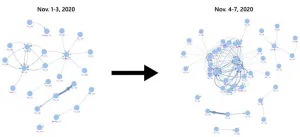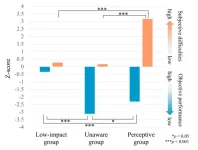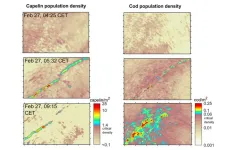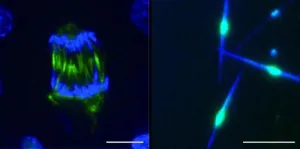Major events like presidential elections bring online hate communities together
New study details how major real-world events grow and strengthen global hate networks online, inciting new hate content around specific hot-button issues.
2024-10-29
(Press-News.org) WASHINGTON (October 29, 2024) – A new study published today details the ways in which the 2020 U.S. election not only incited new hate content in online communities but also how it brought those communities closer together around online hate speech. The research has wider implications for better understanding how the online hate universe multiplies and hardens around local and national events such as elections, and how smaller, less regulated platforms like Telegram play a key role in that universe by creating and sustaining hate content.
The study – published in the journal npj Complexity, part of the Nature portfolio of journals – found that the 2020 U.S. election drew approximately 50 million accounts in online hate communities closer together and in closer proximity with the broader mainstream, including billions of people.
The research also found the election incited new hate content around specific issues, such as immigration, ethnicity, and antisemitism that often align with far-right conspiracy theories. The research identified a significant uptick in hate speech targeting these three issues around November 7, 2020, when then president-elect Joe Biden was declared the winner in the U.S. presidential race. The team also identified a similar surge in anti-immigration content on and after January 6, 2021.
The research team developed a powerful new tool to take a closer look at the online world and the hate content spreading there. Led by George Washington University physics professor Neil Johnson, GW researchers Rick Sear and Akshay Verma built an ‘online telescope’ that maps the online hate universe at unprecedented scale and resolution.
“Politics can be a catalyst for potentially dangerous hate speech. Combine that with the internet, where hate speech thrives, and that’s an alarming scenario. This is why it’s critical to understand exactly how hate at the individual level multiplies to a collective global scale,” says Johnson. “This research fills in that gap in understanding of how hate evolves globally around local or national events like elections.”
Johnson and the research team found that the social media platform Telegram acts as a central platform of communication and coordination between hate communities; yet, Telegram is often overlooked by U.S. and E.U. regulators, Johnson says
Moving forward, the researchers suggest that current policies focused only on popular platforms – such as the more widely used sites of Facebook, Twitter, or TikTok – will not be effective in curbing hate and other online harms, since various platforms can play different roles in the online hate community. Additionally, they recommend that any anti-hate messaging deployed to combat online hate speech should not be tied specifically to the event itself, since hate speech around real-world events may also incorporate adjacent themes. By only targeting anti-hate messaging around a U.S. election for example, messaging may neglect to reach audiences who are spreading hate speech around issues of immigration, ethnicity, or antisemitism.
The paper, “How U.S. Presidential elections strengthen global hate networks” was published October 29, 2024. The U.S. Air Force Office of Scientific Research and The John Templeton Foundation funded the research.
-GW-
END
[Attachments] See images for this press release:


ELSE PRESS RELEASES FROM THIS DATE:
2024-10-29
A research team led by Professor Takahiro Nemoto at Toho University, in collaboration with Associate Professor Naoki Hashimoto and Assistant Professor Ryo Okubo at Hokkaido University, and Dr. Satoru Ikezawa at the National Center of Neurology and Psychiatry explored the agreement or discrepancy between subjective social cognitive difficulties and actual cognitive impairment. The study aimed to identify clinical subtypes in patients with schizophrenia, the results of which were published in Springer-Nature’s journal Schizophrenia on October 29, 2024.
Key Points
In patients with schizophrenia, a decline in social cognition—a fundamental skill for interpersonal ...
2024-10-29
A pitiful sound from tinny speakers, sad virtual eyes, trembling robot arms: it doesn’t take much to feel sorry for a robot. This is the conclusion of a study by Marieke Wieringa, who will be defending her PhD thesis at Radboud University on 5 November. But she warns that our human compassion could also be exploited: just wait until companies find a revenue model for emotional manipulation by robots.
Objectively, we know that a robot cannot experience pain. Still, under certain circumstances, ...
2024-10-29
There is power in numbers, or so the saying goes. But in the ocean, scientists are finding that fish that group together don’t necessarily survive together. In some cases, the more fish there are, the larger a target they make for predators.
This is what MIT and Norwegian oceanographers observed recently when they explored a wide swath of ocean off the coast of Norway during the height of spawning season for capelin — a small Arctic fish about the size of an anchovy. Billions of capelin migrate each February from the edge of the Arctic ...
2024-10-29
A living cell is a bustling metropolis, with countless molecules and proteins navigating crowded spaces in every direction. Cell division is a grand event which completely transforms the landscape. The cell starts behaving like the host of an international competition, reconfiguring entire streets, relocating buildings and rerouting its transportation systems.
For decades, researchers have been captivated by the cell's ability to organise such a dramatic transformation. Central to the process is the microtubule cytoskeleton, a network of fibres which provides structural support and facilitates movement within the cell, ensuring that chromosomes ...
2024-10-29
Using laser-guided imaging to peer through dense jungle forests, Tulane University researchers have uncovered vast unexplored Maya settlements in Mexico and a better understanding of the ancient civilization's extent and complexity.
The new research, published in the journal Antiquity, was led by Tulane University anthropology doctoral student Luke Auld-Thomas and his advisor, Professor Marcello A. Canuto.
The team used lidar, a laser-based detection system, to survey 50 square miles of land in Campeche, Mexico, an area largely overlooked by archaeologists. Their findings included evidence of more than 6,500 pre-Hispanic structures, including a previously unknown ...
2024-10-29
AN EXPERT on missing persons and unidentified human remains is hoping her research can help bring about a change in the law.
Work carried out by Emma Tilley, who is completing her PhD in Criminology and Policing at University of Staffordshire, is included in a Law Commission public consultation on burial and cremation.
Emma, who has starred in Locate International’s Channel 4 documentary series The Body Detectives, has been critically reviewing the cross-matching of unidentified human remains ...
2024-10-29
Our ability to see starts with the light-sensitive photoreceptor cells in our eyes. A specific region of the retina, termed fovea, is responsible for sharp vision. Here, the color-sensitive cone photoreceptors allow us to detect even the smallest details. The density of these cells varies from person to person. Additionally, when we fixate on an object, our eyes make subtle, continuous movements, which also differ between individuals. Researchers from the University Hospital Bonn (UKB) and the University of Bonn have now investigated how sharp vision is linked to these tiny eye movements and ...
2024-10-29
Brisbane, Queensland, Australia (October 29, 2024) - In a revealing Genomic Press Interview published in Brain Medicine on October 29, 2024, Professor Vicki Clifton shares transformative discoveries about the placenta's unexpected influence on maternal mental health, potentially revolutionizing our understanding of pregnancy-related anxiety and depression.
Professor Clifton's team at the Mater Research Institute-University of Queensland has identified 13 distinct glucocorticoid receptor isoforms in the placenta, with one particular variant ...
2024-10-29
Barcelona, Spain (October 29, 2024) - In a compelling new Genomic Press Interview published in Brain Medicine, Dr. Raül Andero Galí reveals how his early passion for classical piano shaped his unique approach to neuroscience research. As an ICREA Research Professor at the Autonomous University of Barcelona, Dr. Andero Galí leads groundbreaking studies that connect mouse and human fear responses, potentially revolutionizing treatments for PTSD and anxiety disorders.
The intersection of stress and memory has captured Dr. Andero Galí's attention throughout his career. "All ...
2024-10-29
Pioneering research to protect and conserve Arctic whale populations is to begin under a new five-year collaboration between Heriot-Watt University in Edinburgh, Scotland and HX Expeditions (Hurtigruten Expeditions), a world leader in travel exploration.
The partners have signed a five-year Memorandum of Understanding (MoU), beginning in 2024, to research challenges facing marine life in the high Arctic – the most northern part of the Arctic region and one of the world’s most fragile ecosystems.
The agreement will see Heriot-Watt University and HX work together on the Whales & Arctic Vessels Project (WAVE), ...
LAST 30 PRESS RELEASES:
[Press-News.org] Major events like presidential elections bring online hate communities together
New study details how major real-world events grow and strengthen global hate networks online, inciting new hate content around specific hot-button issues.








